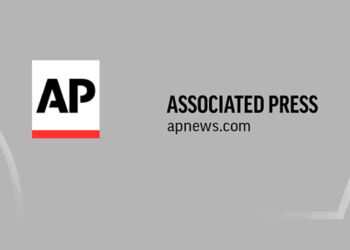A $10,000 selfie has captured headlines.
In a series of now-viral videos posted to TikTok, entrepreneur Sean Davis alleged that a luxury short-term rental in Joshua Tree sent him the five-figure bill after someone in his party took a photo in the bathroom and tagged a brand on social media. Tabloids ran with the tale.
But it’s not exactly true, according to the owners of the mirror-walled monolith that’s known as the Invisible House. They say they charged Davis production fees after he was caught staging an unpermitted photoshoot for his clothing company on the trademarked property back in June of 2021.
“His intention was to shoot some stuff there and he thought he could get around calling it a production,” said owner Chris Hanley, a film producer whose credits include cult classics “American Psycho” and “The Virgin Suicides.” He spoke by phone from another architectural property he owns on Lamu Island in Kenya.
Davis said he was surprised his videos generated so much attention, given his modest following. The co-founder of John Geiger clothing and footwear said he reserved the Invisible House for a company retreat but had hoped to make the most of the booking by also shooting content in the surrounding environs.
During his stay, Davis and three others — a business partner, a photographer and a model — walked away from the home into what they thought was open desert to take photos. They didn’t realize the house sits on 90 acres and unpermitted commercial activity is forbidden anywhere on the property, he said.
“If you’re respecting the house, why is it a problem if you go use the desert to shoot content with four people and a camera?” Davis said. “It’s not like it’s a huge production.”
That’s the crux of the dispute: Was it a few innocent photos or an unauthorized production?
Hanley and his wife Roberta, a screenwriter and director, built the Invisible House in 2019. Part abode, part modern art installation, it has been featured in Architectural Digest and served as the backdrop for more than 100 productions, including campaigns for Hermes and BMW, Hanley said, noting that famed photographer Annie Leibovitz has shot there for Vogue. Some of those shoots have also taken place outside the home — the natural landscape of the property is its own unique work of art, he said.
The home can be reserved as a short-term rental for roughly $3,000 a night or it can be booked for commercial activity for about $1,000 an hour plus additional costs associated with film permits and site management, Hanley said. Commercial activity also requires paperwork allowing a brand to use the property’s copyrights and trademarks, he said.
“Everyone knows that you’re not allowed to just shoot there,” Roberta Hanley said. “The house is copyrighted as a visual — the whole place, the whole concept.”
Although Davis booked the property through a short-term rental platform, security cameras captured him conducting a photoshoot outside, the Hanleys said. He also brought a drone into the house without permits or a licensed pilot, which could have caused damage, they said.
And while Davis said in his videos that he was billed $10,000 for the accommodations and another $10,000 in fees associated with the photoshoot, the Hanleys provided documents stating he was charged $9,000 in total — $3,000 for the booking, $2,500 in a forfeited security deposit and $3,500 upon signing a separation agreement and release of claims.
The Hanleys also took issue with Davis’ claim that a selfie triggered the charges. “I’ve had clients call me up saying, ‘you’re not gonna charge me $10,000 if I take a selfie, are you?’ and it’s like ‘What?’ ” Chris Hanley said. “I mean, if you’re just taking a photo of yourself and not promoting a product, that’s fine.”
But according to Davis, the rental’s management company only checked security footage at the house and realized he’d taken pictures for his brand after a friend’s girlfriend uploaded a photo of her outfit to social media and tagged a different clothing brand. That brand then reposted the content and tagged the Invisible House, he said.
Davis said he respects the Hanleys and their “sick” home. He also questioned the precise difference between someone posting content to their personal social media account and promoting a brand, saying that it’s become difficult to know where to draw the line. “Most people rent places for content now,” he said, adding that he’s taken photos in and around other short-term rentals without issue.
But the Hanleys said the rules governing the use of their property are made clear to guests both before and upon booking. And Davis is a good example of why they charge for commercial activity, they said, pointing out that his TikTok account has a couple hundred followers but a post on the controversy received 1.5 million views.
“It’s impressive, the explosion of excitement he was able to get for himself,” Roberta Hanley said.
“Maybe we should collaborate on Invisible House sneakers,” her husband quipped.
The post Did Joshua Tree’s Invisible House charge $10,000 for a selfie? Here’s what the owner says appeared first on Los Angeles Times.




